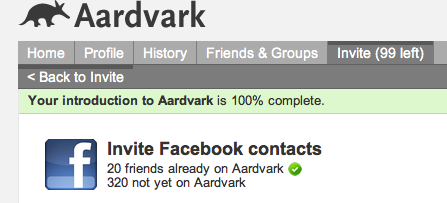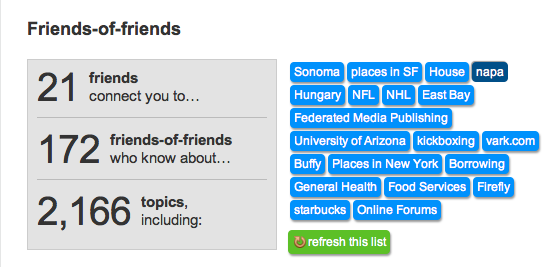“Help Engine” Aardvark Makes Twitter An Onramp For Q&A
Danny has described Aardvark as a “help engine” and I’ve called it an “answer community.” Whatever term you want to use to characterize the service it’s very interesting and has enormous potential as a kind of search engine alternative or complement for recommendations, opinions or complex questions. There are other services that are similar though […]
Danny has described Aardvark as a “help engine” and I’ve called it an “answer community.” Whatever term you want to use to characterize the service it’s very interesting and has enormous potential as a kind of search engine alternative or complement for recommendations, opinions or complex questions. There are other services that are similar though not identical (see, ChaCha, kgb, Yahoo Answers, Hunch). The closest is probably Mosio, which seems to be morphing from a consumer-facing service into a kind of B2B platform.
For those not already familiar with Aardvark (or Vark), it matches people who can respond to questions asked by other people. One can ask about “best pinot noirs under $15” or “recommendations for things to do with kids in Monterey, California” or “places to stay in NYC for under $200” (all real questions I’ve asked). It uses a sophisticated algorithm to send those questions to appropriate members of the community who’ve tagged themselves as interested or capable of answering — and who are already part of your network or friends of friends. That’s a key component of the service; answers aren’t going to the anonymous throng but members of your extended community.
It uses instant messaging and email as tools, which can also be accessed via mobile devices. An iPhone app is on deck. It leverages Facebook Connect to link you up with people you know already who are using the service and to encourage you to invite members of your extended community:
The aforementioned “matching algorithm” in the middle is the secret sauce. Rather than develop a “semantic” understanding of the question so that it can return a result from a massive search index, Aardvark figures out the right person or people to send the question to. If a would-be responder “isn’t there” it moves on. Only a few people get the question and only two or three answers are provided. If you don’t like the answers you can resubmit the question for additional answers.
Last week the service came out of private beta, inviting people to sign up via Facebook Connect. Today the service is adding Twitter. In other words you can sign in and ask questions to Aardvark using Twitter and receive responses via direct message on Twitter:
One thing this enables is the simultaneous questioning of your Twitter followers and the Vark community if you choose to post the question publicly on Twitter (vs direct message). Many people are starting to use Twitter and Facebook as Q&A tools, although the response quality and volume is generally uneven in my experience. I once thought that Twitter would develop a service similar to Vark but I don’t believe that it will at this point.
Vark also gives users lots of control over what types of questions and how many they receive:
In terms of making money, CEO Max Ventilla (a former Googler) says that the company is already getting lots of commercial queries and that it plans to establish affiliate relationships and embed links accordingly where relevant and appropriate. Think product recommendation requests, travel, etc. Making lots of money off affiliate deals however will require lots of scale.
It’s pretty clear that the Aardvark team has thought through the vast majority of issues and use cases. From my preliminary experience, the service works well and will improve as more people and their communities sign on. Although the idea of having the community respond to search queries obviously isn’t new, the execution is probably the best I’ve seen.
Contributing authors are invited to create content for Search Engine Land and are chosen for their expertise and contribution to the search community. Our contributors work under the oversight of the editorial staff and contributions are checked for quality and relevance to our readers. The opinions they express are their own.
Related stories
New on Search Engine Land




